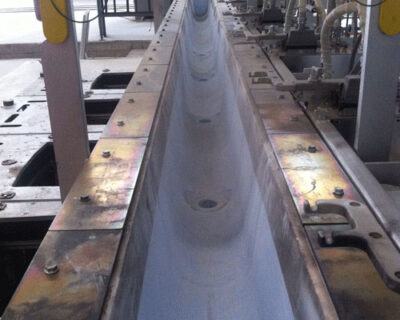The versatility of Aluminum Metal Casting in various industrial sectors
Best Practices for Maintenance and Applications in the Aluminum Factory Market: An In-depth Summary
Keeping tools in the aluminum factory sector is essential for operational success. Routine assessments and anticipating upkeep can greatly minimize downtime and improve safety and security. Advanced technologies, such as IoT and information analytics, play a crucial role in this procedure. Nonetheless, recognizing the complete range of best methods requires a closer examination of particular methods and their influence on effectiveness. What are the necessary parts that add to a reputable maintenance structure?
Relevance of Regular Upkeep in Aluminum Foundries
Regular upkeep plays a vital role in the effective operation of light weight aluminum foundries. By systematically evaluating and servicing tools, shops ensure peak performance and longevity of machinery. Routine upkeep tasks, such as lubrication, element, and cleaning replacement, aid avoid unexpected failures that can lead to pricey downtime.
Routine checks boost work environment safety by determining possible hazards before they escalate right into major concerns. Devices that is properly maintained operates better, resulting in boosted item top quality and lowered waste. Additionally, adherence to a structured upkeep timetable can sustain conformity with sector regulations, consequently cultivating an online reputation for reliability and top quality within the marketplace.
Executing Anticipating Upkeep Techniques
Anticipating upkeep techniques take the concepts of regular upkeep a step even more by leveraging data analytics and advanced tracking innovations. In aluminum shops, these techniques enable drivers to prepare for equipment failings prior to they occur, thus decreasing unintended downtimes and maximizing operational efficiency. By making use of sensors and IoT gadgets, real-time information can be gathered on equipment performance, enabling the identification of possible problems via anticipating analytics.
Optimizing Melting and Putting Processes
Efficient melting and putting procedures are essential for maximizing performance and ensuring the quality of light weight aluminum spreadings. To improve these procedures, factories must concentrate on precise temperature level control throughout melting, as this directly affects the metallurgical residential or commercial properties of the alloy. Using advanced melting innovations, such as induction and resistance melting, can boost power performance and decrease cycle times.
Applying automated putting systems reduces human mistake and keeps consistency in the pouring process. Correct mold prep work, consisting of adequate preheating, is vital to stop thermal shock and boost mold and mildew long life.

Enhancing Security Procedures in Shop Workflow
Focusing on safety in light weight aluminum factory operations is essential for safeguarding workers and guaranteeing a productive environment. Efficient safety protocols include routine training sessions that stress the significance of personal protective devices (PPE), such as gloves, goggles, and headgears. Additionally, the establishment of clear emergency procedures is necessary in managing potential crashes.
Regular examinations of devices and machinery help determine hazards before they rise right into severe concerns. Executing a durable coverage system urges workers to interact safety problems without worry of repercussion. Furthermore, promoting a culture of safety and security assurances that every employee recognizes their function in preserving a safe and secure office.
In addition, assuring appropriate air flow and monitoring air high quality can reduce exposure to hazardous fumes and dust. By strengthening these practices, aluminum factories can substantially minimize the threat of accidents and develop an environment where staff members really feel valued and risk-free, inevitably enhancing total functional performance.
Leveraging Innovation for Improved Effectiveness
Making use of advanced technology has become progressively vital for aluminum factories intending to enhance operational efficiency. Automation and robotics play an important function in streamlining manufacturing processes, lowering labor expenses, and minimizing human error. Executing real-time monitoring systems permits the continual assessment of equipment performance, making it possible for positive maintenance and minimizing downtime.
The assimilation of information analytics supplies important understandings into operational operations, promoting much better decision-making and source allotment. Anticipating analytics can recognize potential failures prior to they take place, more optimizing maintenance timetables.
Furthermore, embracing innovative melting and spreading modern technologies enhances energy performance and material return, which are essential for sustainability in the sector. By welcoming these technical developments, light weight aluminum foundries can not just enhance performance but additionally maintain an one-upmanship in an increasingly demanding market (aluminum casting company). Eventually, leveraging technology is essential in driving innovation and improving general operational performance within the industry

Frequently Asked Questions
What Are Common Indicators of Devices Use in Light Weight Aluminum Foundries?
Common signs of tools wear in aluminum foundries include unusual sounds, lowered effectiveness, raised vibration, overheating site here components, leaks, and visible corrosion. These signs typically signal the requirement for maintenance or potential replacement to stay clear of pricey downtime.
Exactly How Can I Train Personnel for Effective Upkeep Practices?
To train team for efficient upkeep practices, one can apply hands-on workshops, establish comprehensive handbooks, encourage mentorship programs, and carry out routine evaluations to review skills and understanding, making sure all employees recognize upkeep procedures extensively.
What Are the Ecological Laws for Light Weight Aluminum Foundries?
Light weight aluminum factories are subject to numerous ecological regulations, including emissions control, waste administration, and source conservation. Conformity warranties minimal ecological impact, promoting sustainability while adhering to neighborhood, national, and global environmental criteria and regulations.
Exactly How Do Shops Take Care Of Waste and Recycling of Light weight aluminum?
Shops handle waste and recycling by executing systems for collecting scrap aluminum, utilizing advanced splitting up modern technologies, and collaborating with reusing centers to ensure efficient healing procedures, thus decreasing ecological effect and site here promoting sustainability within the market.
What Are the Prices Linked With Carrying Out Advanced Technologies?
Applying sophisticated modern technologies in factories incurs significant prices, including preliminary investment, training, and maintenance expenses. The long-lasting advantages, such as raised efficiency and minimized waste, typically justify these expenses, leading to boosted success. (Aluminum Casting)
